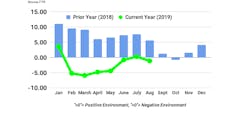FTR’s August TCI reflects mediocre carrier environment
FTR’s Trucking Conditions Index for August, at a -1.11 reading, was negatively impacted by weak utilization and higher financing costs.
FTR forecasts that the TCI will hover around the neutral range through 2020.
Active truck utilization edged down in August to 87.4%. Although FTR’s current outlook calls for a gradual firming, active utilization is expected to remain below the 10-year average of 91% through 2020. Freight-related indicators continue to diverge between the no-growth industrial sector and the still-growing consumer sector. FTR’s loadings outlook is for a 0.5% increase in 2019 and 0.9% growth in 2020.
“Although trucking conditions are weak, we believe that they have stabilized for the industry as a whole,” said Avery Vise, FTR’s vice president of trucking. “However, larger carriers appear to be faring much better than small carriers, which are far more exposed to weak spot rates and to rising liability insurance costs.
“We might be seeing an accelerated shakeout of active capacity that could lead to firmer utilization and freight rates.”
Details of the TCI for August are found in the October issue of FTR’s Trucking Update, published Sept 30. The ‘Notes by the Dashboard Light’ section outlines the effects of global trade on the US economy. Along with the TCI and ‘Notes by the Dashboard Light,’ the Trucking Update includes data and analysis on load volumes, the capacity environment, rates, costs and the truck driver situation.
The TCI tracks the changes representing five major conditions in the US truck market. These conditions include freight volumes, freight rates, fleet capacity, fuel price and financing. The individual metrics are combined into a single index indicating the industry’s overall health. A positive score represents good, optimistic conditions. Conversely, a negative score represents bad, pessimistic conditions. Readings near zero are consistent with a neutral operating environment, and double-digit readings (up or down) suggest significant operating changes are likely.
